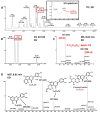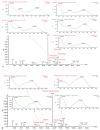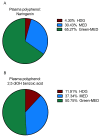The Metabolomic-Gut-Clinical Axis of Mankai Plant-Derived Dietary Polyphenols
- PMID: 34070816
- PMCID: PMC8229908
- DOI: 10.3390/nu13061866
The Metabolomic-Gut-Clinical Axis of Mankai Plant-Derived Dietary Polyphenols
Abstract
Background: Polyphenols are secondary metabolites produced by plants to defend themselves from environmental stressors. We explored the effect of Wolffia globosa 'Mankai', a novel cultivated strain of a polyphenol-rich aquatic plant, on the metabolomic-gut clinical axis in vitro, in-vivo and in a clinical trial.
Methods: We used mass-spectrometry-based metabolomics methods from three laboratories to detect Mankai phenolic metabolites and examined predicted functional pathways in a Mankai artificial-gut bioreactor. Plasma and urine polyphenols were assessed among the 294 DIRECT-PLUS 18-month trial participants, comparing the effect of a polyphenol-rich green-Mediterranean diet (+1240 mg/polyphenols/day, provided by Mankai, green tea and walnuts) to a walnuts-enriched (+440 mg/polyphenols/day) Mediterranean diet and a healthy controlled diet.
Results: Approximately 200 different phenolic compounds were specifically detected in the Mankai plant. The Mankai-supplemented bioreactor artificial gut displayed a significantly higher relative-abundance of 16S-rRNA bacterial gene sequences encoding for enzymes involved in phenolic compound degradation. In humans, several Mankai-related plasma and urine polyphenols were differentially elevated in the green Mediterranean group compared with the other groups (p < 0.05) after six and 18 months of intervention (e.g., urine hydroxy-phenyl-acetic-acid and urolithin-A; plasma Naringenin and 2,5-diOH-benzoic-acid). Specific polyphenols, such as urolithin-A and 4-ethylphenol, were directly involved with clinical weight-related changes.
Conclusions: The Mankai new plant is rich in various unique potent polyphenols, potentially affecting the metabolomic-gut-clinical axis.
Keywords: Mediterranean diet; Wolffia globosa; flavonoids; plant-based nutrition; polyphenols; weight loss.
Conflict of interest statement
Colt M. and Lapidot M. are scientists in Hinoman Ltd.; Shai I. advises the Hinoman, Ltd. nutritional committee. All other authors declare no conflict of interest.
Figures





References
-
- Del Rio D., Rodriguez-Mateos A., Spencer J.P.E., Tognolini M., Borges G., Crozier A. Dietary (poly) phenolics in human health: Structures, bioavailability, and evidence of protective effects against chronic diseases. Antioxid. Redox Signal. 2013;18:1818–1892. doi: 10.1089/ars.2012.4581. - DOI - PMC - PubMed
Publication types
MeSH terms
Substances
Grants and funding
LinkOut - more resources
Full Text Sources
Medical

